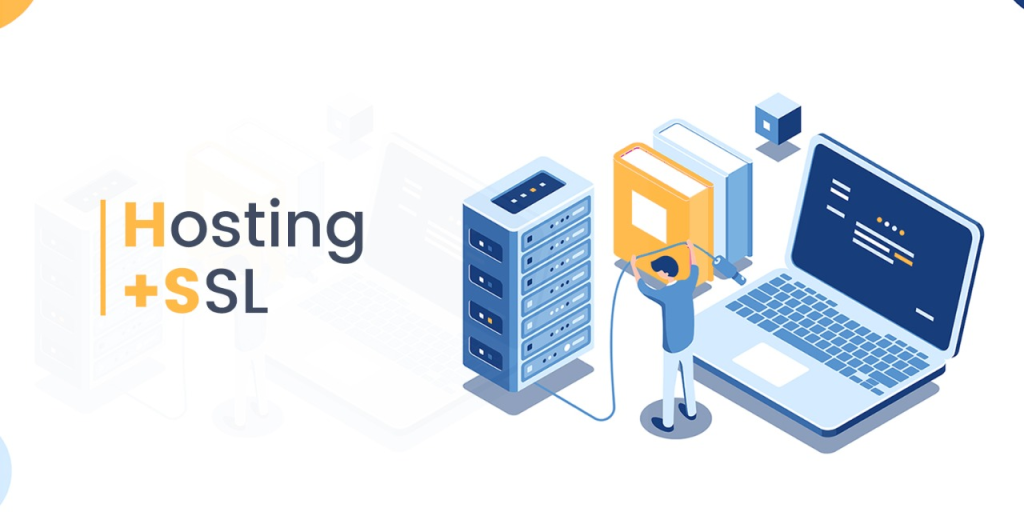I. 🌍 Understanding Website Hosting: The Bedrock of Your Online Presence
A. What Exactly Is Website Hosting?
In the simplest terms, website hosting is the fundamental service that allows individuals and organizations to make their websites accessible to users across the global internet. Think of your website as a digital entity comprised of various files – text documents, vibrant images, engaging videos, intricate code, and essential databases. These digital components need a dedicated space to reside so that they can be accessed and displayed to anyone who types in your unique web address. This is where web hosting services come into play. They provide the digital equivalent of renting space on high-powered computers, known as servers, strategically located in secure data centers. These servers are specifically configured and connected to high-speed internet networks to ensure that your website’s files can be efficiently stored, managed, and delivered to visitors around the world.

When a user wants to visit your website, they type your specific domain name (for instance, yourbusiness.co.ke) into their web browser. This action triggers a complex process behind the scenes. The browser sends a request to a network of servers that translate this human-readable domain name into a numerical Internet Protocol (IP) address, which is essentially the unique address of your hosting server on the internet. Once the correct server is identified, it responds to the browser’s request by locating and transmitting the necessary files that constitute your website. The user’s browser then interprets these files and renders them into the visual and interactive experience you intended. Without web hosting, your website files would simply reside on your personal computer, inaccessible to the wider online community. Therefore, selecting a reliable web hosting service is the very first and arguably most critical step in establishing any form of online presence.

Key concepts that are intrinsically linked to website hosting include:
- Servers: These are not your average desktop computers. Web servers are specialized, robust machines designed for continuous operation and high performance. They are equipped with powerful processors, ample memory (RAM), significant storage capacity, and high-speed network interfaces to handle numerous requests simultaneously and ensure quick delivery of website content. Hosting providers invest heavily in maintaining these servers, ensuring their security, and providing the necessary software and configurations for efficient website operation.
- Bandwidth: Imagine bandwidth as the digital pipeline that facilitates the transfer of data between your web hosting server and your website’s visitors. It’s the measure of the volume of data that can be transmitted over a specific period, typically calculated on a monthly basis. When someone visits a page on your website, downloads a file, or streams a video, they consume bandwidth. The amount of bandwidth your website requires depends on factors such as the number of visitors, the size of your web pages, and the amount of multimedia content you host. Exceeding your allocated bandwidth can sometimes result in additional charges or even temporary suspension of your website, highlighting the importance of choosing a hosting plan with sufficient bandwidth for your anticipated traffic.
- Domain Names: Your domain name is your website’s unique and memorable address on the internet, making it easy for people to find and remember you (e.g., kenyabusinessonline.co.ke). While website hosting provides the physical (or rather, digital) space where your website lives, the domain name acts as the signpost that directs visitors to that location. You typically register your domain name separately through a domain registrar. Once you have both a domain name and a hosting account, you need to configure the DNS (Domain Name System) settings to point your domain name to the IP address of your hosting server, effectively linking your address to your website’s content.
B. Why Robust Hosting Is Non-Negotiable for Your Website’s Success
The selection of a reliable and efficient website hosting service transcends mere online presence; it fundamentally dictates the performance, accessibility, and overall success of your digital endeavors. Poor hosting can lead to a cascade of negative consequences, impacting everything from user experience to search engine rankings and ultimately, your online reputation and potential revenue. Therefore, understanding why robust web hosting is non-negotiable is crucial for making informed decisions.

- Website Speed: The Need for a Fast-Loading Experience: In today’s digital landscape, where attention spans are fleeting and users expect instant gratification, website loading speed is paramount. Studies have consistently shown that visitors are likely to abandon websites that take more than a few seconds to load. According to a Google study, 53% of mobile site visitors leave a page that takes longer than three seconds to load. The quality of your website hosting directly influences your website’s loading speed. Factors such as server response time, server location, and the resources allocated to your hosting account all play a significant role. Slow loading times not only frustrate users, leading to higher bounce rates (the percentage of visitors who leave your site after viewing only one page) but also negatively impact your search engine rankings, as speed is a crucial factor in Google’s algorithm. Investing in robust web hosting in Kenya with servers located closer to your target audience can significantly improve loading times for local visitors. “Website speed is not just a technical metric; it’s a fundamental aspect of user experience and a key factor in search engine optimization.” – Neil Patel, Digital Marketing Expert
- Uptime: Ensuring Consistent Availability for Your Audience: Uptime refers to the percentage of time your website is online and accessible to visitors. A high uptime (ideally 99.9% or higher) is essential for maintaining a professional image, building trust with your audience, and ensuring that your website is always available when potential customers or readers try to access it. Downtime, on the other hand, can result in lost traffic, missed opportunities, damage to your reputation, and even financial losses for e-commerce businesses. Reliable website hosting providers invest in robust infrastructure, redundant systems, and proactive monitoring to minimize downtime and ensure consistent availability. Choosing a web hosting provider in Kenya with a strong track record of high uptime is crucial for maintaining a reliable online presence. Fact: A website with 99.9% uptime experiences approximately 8.76 hours of downtime per year, while a website with 99% uptime can be down for over 3.65 days annually.
- SEO (Search Engine Optimization): A Foundation for Visibility: Search engines like Google consider various factors when ranking websites, and the quality of your website hosting plays an indirect but significant role. As mentioned earlier, website speed and uptime are direct ranking factors. Poor hosting that leads to slow loading times and frequent downtime will negatively impact your SEO efforts. Furthermore, security is another critical aspect. Hosting providers with strong security measures help protect your website from malware and hacking attempts, which can severely harm your search engine rankings and user trust. Choosing a secure and reliable web hosting provider in Kenya lays a solid foundation for your SEO strategy.
- Security: Protecting Your Website and Your Visitors: In today’s digital landscape, cybersecurity threats are increasingly prevalent. A reputable website hosting provider implements robust security measures to protect your website and the data of your visitors. This includes features like firewalls, malware scanning, regular security updates, and often free SSL (Secure Sockets Layer) certificates, which encrypt data transmitted between your website and users, crucial for building trust and ensuring secure transactions. Compromised websites can lead to significant financial losses, damage to your reputation, and legal liabilities. Therefore, choosing a web hosting provider in Kenya with a strong focus on security is paramount.
In essence, your website hosting is not just a technical detail; it’s the very foundation upon which your entire online presence is built. Investing in robust and reliable web hosting in Kenya is an investment in the speed, stability, security, and ultimately, the success of your website.

C. Demystifying How Website Hosting Actually Works
Understanding the fundamental mechanisms behind website hosting can empower you to make more informed decisions when choosing a provider and managing your online presence. While the technical intricacies can be complex, the core process can be explained in a straightforward manner:
- Digital Storage on a Powerful Server Network: At the heart of website hosting lies a network of powerful computers called web servers. These servers, maintained by your hosting provider, are specifically designed and configured to store and serve website files efficiently. When you sign up for a web hosting plan in Kenya, you are essentially allocated space on one of these servers to store all the digital assets that make up your website – your HTML files, CSS stylesheets, JavaScript code, images, videos, databases, and more. These servers are typically housed in secure data centers, which provide a controlled environment with redundant power supplies, cooling systems, high-speed internet connectivity, and physical security measures to ensure continuous operation and data protection.
- The Intricate Role of DNS Routing: When a user wants to access your website, they type your memorable domain name (e.g., yourkenyanbusiness.co.ke) into their web browser. However, computers on the internet communicate using numerical addresses called IP addresses. This is where the Domain Name System (DNS) comes into play. The DNS acts as a global directory or phonebook for the internet. When a browser requests your domain name, the DNS system looks up the corresponding IP address of the web hosting server where your website’s files are stored. This translation process is seamless and happens in milliseconds, directing the user’s browser to the correct server without them even realizing it. The DNS records, which link your domain name to your server’s IP address, are managed by your domain registrar and can be configured through your hosting provider’s control panel.
- Content Delivery: From Server to User’s Screen: Once the user’s browser has obtained the IP address of your web hosting server through the DNS lookup, it sends a request to that specific server for the files associated with the web page the user is trying to access. The web server software running on the hosting server receives this request, locates the requested files within its storage, and then transmits these files back to the user’s browser over the internet. The browser then interprets these files – the HTML structure, the CSS styling, the JavaScript interactivity, the images, and the videos – and renders them into the visual and interactive web page that the user sees on their screen. This entire process, from typing the domain name to the website appearing in the browser, happens remarkably quickly, thanks to the efficient infrastructure of web hosting providers.
- Ensuring Uninterrupted Uptime: A crucial aspect of website hosting is the commitment of providers to ensure high uptime, meaning that their servers and network infrastructure are operational and accessible around the clock. Reliable hosting providers in Kenya invest significantly in maintaining their servers, implementing redundant systems (backup power, multiple network connections), and employing proactive monitoring to detect and resolve potential issues before they cause downtime. High uptime is essential for ensuring that your website is consistently available to your audience, regardless of their location or the time of day. This reliability is a key differentiator among web hosting providers.
In essence, website hosting is a complex yet vital service that forms the backbone of the internet. By providing secure storage, efficient content delivery, and reliable uptime, web hosting providers in Kenya enable individuals and businesses to establish and maintain a successful online presence. Understanding these fundamental processes can help you appreciate the value of choosing a quality hosting service.
II. 🧠 Exploring the Different Flavors of Website Hosting
When embarking on your journey to find the ideal website hosting in Kenya, you’ll quickly discover that there isn’t a one-size-fits-all solution. The world of web hosting offers a variety of distinct types, each tailored to cater to different needs, technical skills, website sizes, and budget constraints. Understanding the nuances of these various hosting options is paramount to making an informed decision that will best support your online aspirations.

A. The Main Categories of Web Hosting Explained
Let’s delve deeper into the primary types of web hosting you’ll encounter in the Kenyan market:
- Shared Hosting: Often the entry point for individuals and small businesses, shared hosting is akin to residing in an apartment complex. Your website shares the resources of a single, powerful server – including CPU processing power, random access memory (RAM), and disk storage – with numerous other websites. This shared resource model makes shared hosting the most cost-effective option, as the server’s operational costs are distributed among many users. It’s generally user-friendly, with the hosting provider managing the server’s technical aspects, making it ideal for beginners or those with limited technical expertise. However, because resources are shared, your website’s performance can be influenced by the activity of other websites on the same server. If a neighboring site experiences a sudden surge in traffic or consumes excessive resources, it can potentially impact the speed and stability of your own website. Shared hosting in Kenya is a popular choice for personal blogs, small business websites with moderate traffic, and static websites.
- VPS (Virtual Private Server) Hosting: Stepping up from shared hosting, VPS hosting offers a more robust and controlled environment. Imagine a physical server being partitioned into multiple isolated virtual servers. Each VPS operates independently with its own dedicated portion of the server’s resources, including CPU, RAM, and storage. While multiple VPSs reside on the same physical hardware, the virtualization technology ensures that each operates as if it were its own dedicated server. This provides users with greater control over their server environment, allowing for custom software installations and configurations. VPS hosting in Kenya strikes a balance between cost and performance, making it suitable for growing businesses, websites with moderate to high traffic, and applications that require more resources and customization than shared hosting can offer. It typically requires a higher level of technical proficiency compared to shared hosting.
- Dedicated Hosting: For websites demanding the ultimate in performance, control, and security, dedicated hosting provides the solution of having an entire physical server exclusively for your website. This is akin to owning your own house – you have complete control over all the resources and configurations of the server. With dedicated hosting in Kenya, you are not sharing server resources with any other websites, ensuring optimal performance, maximum security, and the flexibility to tailor the server environment precisely to your specific needs. This type of hosting is ideal for high-traffic websites, e-commerce platforms with a large number of transactions, and resource-intensive applications. However, dedicated hosting is the most expensive option and typically requires significant technical expertise to manage and maintain the server effectively.
- Cloud Hosting: Representing a more modern and scalable approach, cloud hosting leverages a network of virtual servers that draw resources from a vast, distributed pool of physical servers. Unlike traditional hosting where your website resides on a single server, cloud hosting in Kenya allows your website to tap into the collective power of this interconnected network. This offers significant advantages in terms of scalability and reliability. If one server in the cloud experiences an issue, another can seamlessly take over, minimizing downtime. Cloud hosting is highly flexible, allowing you to easily scale your resources up or down based on your website’s needs, and often follows a pay-as-you-go pricing model, where you only pay for the resources you actually consume. This makes it an attractive option for businesses with fluctuating traffic or those anticipating rapid growth. Examples of cloud hosting platforms available in Kenya include those offered by local providers leveraging their own infrastructure or international cloud giants with a presence in the region.
- Managed WordPress Hosting: Specifically tailored for websites built using the popular WordPress content management system (CMS), managed WordPress hosting in Kenya provides an optimized environment for WordPress sites. Providers offering this type of hosting typically handle many of the technical aspects of running a WordPress site, such as automatic updates to the WordPress core, themes, and plugins, enhanced security measures specifically designed for WordPress, regular backups, and often offer specialized WordPress support. This allows website owners to focus on creating content and managing their website without having to worry about the underlying technical complexities. While generally more expensive than basic shared hosting, the convenience and performance optimizations of managed WordPress hosting make it a popular choice for individuals and businesses heavily invested in the WordPress ecosystem.
B. Weighing the Pros and Cons of Each Hosting Type
Choosing the right website hosting in Kenya necessitates a careful evaluation of the advantages and disadvantages of each type in relation to your specific requirements and financial considerations. The critical factors often revolve around resource allocation – how much of the server’s capabilities are dedicated to your website – and the trade-off between cost vs. performance – how much you’re willing to invest for the level of speed, reliability, and control you need.
| Hosting Type | Pros | Cons |
|---|---|---|
| Shared Hosting | Most affordable, making it accessible for beginners and small projects. Easy to get started with user-friendly control panels. The hosting provider manages server maintenance and security updates, reducing the technical burden on the user. | Limited resources as they are shared among many users, potentially leading to performance bottlenecks during peak traffic. Performance can be affected by other websites on the same server. Less control over server configurations and software installations. |
| VPS Hosting | Offers more dedicated resources (CPU, RAM, storage) compared to shared hosting, leading to better performance and stability. Provides greater control over the server environment, allowing for custom software installations and configurations. More scalable than shared hosting. | More expensive than shared hosting. Requires some technical knowledge to manage the server effectively, although managed VPS options are available. Can still be affected by the underlying physical server’s limitations. |
| Dedicated Hosting | Provides maximum resources and control, with the entire server dedicated solely to your website. Offers highest levels of performance and security. Highly customizable server environment to meet specific application requirements. | Most expensive hosting option. Requires significant technical expertise to manage and maintain the server, including security, updates, and troubleshooting. The user is fully responsible for server administration. |
| Cloud Hosting | Highly scalable and flexible, allowing you to easily adjust resources based on demand. Excellent reliability due to the distributed nature of the infrastructure; if one server fails, others can take over. Often follows a pay-as-you-go pricing model, optimizing costs. | Can become expensive with high usage if not carefully managed. The level of control can vary depending on the cloud provider and the specific services chosen. Can sometimes be more complex to understand the pricing structure. |
| Managed WordPress | Optimized specifically for WordPress, offering enhanced performance and security for WordPress sites. Includes automatic WordPress updates and backups. Provides specialized WordPress support. Allows users to focus on content creation rather than technical server management. | Only suitable for WordPress websites. Can be more expensive than basic shared hosting. May have limitations on the types of plugins or customizations allowed. |
Export to Sheets
C. Identifying the Ideal Hosting Type for Your Unique Needs
The quest for the best website hosting in Kenya ultimately boils down to aligning your specific requirements with the capabilities and limitations of each hosting type. There’s no universally “best” option; rather, the ideal choice depends on a confluence of factors:

- Website Traffic and Growth Projections: A fledgling personal blog with minimal initial traffic will have vastly different resource demands compared to a well-established e-commerce platform experiencing hundreds or thousands of daily visitors. Accurately forecasting your website’s current and future traffic is crucial. If you anticipate significant growth, opting for a more scalable solution like VPS hosting or cloud hosting in Kenya from the outset can save you the hassle of migrating later. Consider your budget vs. traffic expectations carefully.
- Technical Proficiency and Management Preferences: Your level of technical expertise will significantly influence the type of hosting you can comfortably manage. Shared hosting and managed WordPress hosting are generally more user-friendly, with the provider handling most of the server administration. VPS hosting and especially dedicated hosting require a greater degree of technical know-how for server configuration, security updates, and troubleshooting. If you lack the technical skills or prefer to focus on your website’s content and business aspects, a managed hosting solution might be the most suitable.
- Budgetary Constraints: Hosting costs vary considerably across the different types. Shared hosting is the most budget-friendly, making it an attractive option for individuals and startups with limited financial resources. VPS hosting offers a middle ground in terms of both cost and performance. Dedicated hosting represents the highest investment, typically justified for high-traffic, mission-critical websites. Cloud hosting can be cost-effective for fluctuating traffic but can become expensive with consistently high resource consumption. Carefully assess your budget and choose a hosting plan that provides the necessary resources and features without exceeding your financial limitations.
- Scalability Requirements: If you foresee your website experiencing significant growth over time, the ability to easily scale your hosting resources is a critical consideration. Cloud hosting excels in this area, allowing you to seamlessly increase your CPU, RAM, and storage as needed. VPS hosting also offers scalability, although it might involve more manual upgrades. Shared hosting typically has more limited scalability, and migrating to a higher-tier plan or a different hosting type might be necessary as your website grows. Dedicated hosting offers maximum resources from the outset, but scaling often involves upgrading the physical server itself, which can be a more involved process.
By carefully considering these factors – your anticipated traffic, technical skills, budget, and scalability needs – you can navigate the diverse landscape of website hosting in Kenya and select the type that will best empower your online success.
III. 🌍 The Website Hosting Landscape in Kenya: Local Advantages
A. Local Hosting Options: Are They Available in Kenya?
The answer is a resounding yes, website hosting is not only available but also increasingly robust and competitive within Kenya. Gone are the days when Kenyan businesses and individuals solely relied on international hosting providers. Today, a thriving ecosystem of local web hosting companies in Kenya has emerged, offering a diverse range of hosting solutions tailored to the specific needs of the Kenyan market. These providers operate their own data centers or lease space in strategically located facilities within the country, ensuring that your website can be hosted right here in Kenya. This development signifies a significant advancement in the local digital infrastructure, providing numerous benefits for those seeking hosting services in Kenya.

Several prominent players have established themselves as key providers of Kenyan data center infrastructure, which forms the backbone of the local hosting industry. These include:
- Safaricom: As the leading telecommunications provider in Kenya, Safaricom has invested heavily in building state-of-the-art data centers to support its vast network and a growing demand for local hosting services. Their infrastructure offers robust connectivity and reliability.
- iColo (now Digital Realty): A carrier-neutral data center provider with strategically located facilities in Nairobi and Mombasa. iColo provides colocation services to various local and international hosting providers, ensuring high-quality infrastructure and connectivity.
- Angani: A homegrown Kenyan cloud service provider that operates its own cloud infrastructure within the country. Angani offers a range of cloud-based hosting solutions, providing scalability and flexibility to Kenyan businesses.
- Other Local Providers: Beyond these major players, numerous other local web hosting companies in Kenya operate their own smaller data centers or lease space in larger facilities, contributing to the overall availability and competitiveness of the market.
This local infrastructure for hosting means that you have the tangible option of keeping your website’s data and server within the geographical boundaries of Kenya. This can have significant implications for performance, compliance, and support, as we will explore further in this section. The growth of the local hosting industry reflects the increasing demand for reliable and efficient online services within Kenya and the commitment of local providers to meet these needs.
B. The Compelling Reasons to Choose a Kenyan Hosting Provider
While the global nature of the internet offers a plethora of hosting options worldwide, opting for a Kenyan hosting provider can offer several distinct and compelling advantages, particularly for individuals and businesses primarily targeting a Kenyan audience:
- Reduced Latency and Faster Load Times for Local Visitors: One of the most significant benefits of choosing website hosting in Kenya is the potential for significantly reduced latency. Latency refers to the delay in data transfer between the server hosting your website and the computers or devices of your visitors. When your server is located geographically closer to your target audience, the data has a shorter distance to travel, resulting in faster response times and quicker loading of your web pages. For businesses primarily serving customers within Kenya, this can lead to a noticeably improved user experience. Studies have shown that even a one-second delay in page load time can lead to a 7% reduction in conversion 1 rates. By choosing a Kenyan hosting provider, you are essentially placing your digital storefront closer to your local customers, ensuring a smoother and more responsive browsing experience. 1. mikemckearin.com mikemckearin.com Case Study: A Kenyan e-commerce business selling locally handcrafted goods migrated their website from a US-based host to a provider with servers in Nairobi. They reported a 30% decrease in average page load time for Kenyan visitors and a subsequent 15% increase in their online sales within the first three months. This highlights the tangible impact of local hosting on user experience and business outcomes.
- Localized Support and Understanding of the Local Context: Kenyan hosting providers often possess a deeper understanding of the specific needs and challenges faced by businesses and individuals operating within Kenya. Their support teams are more likely to be familiar with local internet infrastructure, payment methods (like MPESA), and business practices. This can translate to more relevant and efficient customer support. Dealing with a support team that understands the local context and can communicate effectively in local languages can significantly streamline the process of resolving any technical issues that may arise.
- Potential SEO Benefits for Local Search: While not a definitive ranking factor, some SEO experts believe that having a local IP address associated with your website, which is often the case with Kenyan hosting, can provide a slight advantage in local search engine rankings. When users in Kenya search for local businesses or services, Google and other search engines may prioritize websites hosted within the country. This can help you reach your target Kenyan audience more effectively and improve your visibility in local search results.
- Seamless Integration with .KE Domains: If your target audience is primarily in Kenya, you will likely want a .KE domain name. Kenyan hosting providers are typically well-equipped to handle the registration and configuration of .KE domains, often offering a more streamlined and integrated experience compared to international providers who may not be as familiar with the local domain registration processes managed by KENIC (Kenya Network Information Centre).
- Compliance with Potential Local Data Regulations: As data privacy and sovereignty become increasingly important globally, hosting your data within Kenya with a local provider may offer advantages in terms of complying with any future local data regulations that might be enacted. While Kenya’s data protection laws are still evolving, choosing a local provider can provide a degree of assurance that your data is subject to Kenyan jurisdiction.
In conclusion, while international hosting options may seem appealing, the advantages offered by Kenyan hosting providers – including reduced latency, localized support, potential SEO benefits, seamless .KE domain integration, and potential compliance advantages – make them a compelling choice for individuals and businesses primarily targeting the Kenyan market.
C. Navigating the Challenges of the Kenyan Hosting Industry
Despite the significant growth and numerous advantages of the Kenyan hosting industry, it is important to acknowledge that it still faces certain challenges that potential customers should be aware of:
- Power Reliability and Infrastructure Limitations: While major data centers in Kenya invest heavily in backup power solutions, inconsistent power supply can still be a concern in some areas. This necessitates that Kenyan hosting providers invest in robust uninterruptible power supplies (UPS) and generators to ensure continuous operation. Potential customers should inquire about the provider’s power redundancy measures. Additionally, while internet infrastructure is improving, connectivity outside major urban centers can sometimes be less reliable, potentially affecting server accessibility.
- Higher Infrastructure and Operational Costs: Importing and maintaining server hardware, software licenses, and skilled technical personnel can be more expensive in Kenya compared to some other regions. These higher operational costs can sometimes translate to slightly higher hosting prices compared to some international providers. However, the benefits of local hosting often outweigh this potential cost difference, especially when considering performance and support.
- Limited Availability of IP Addresses: The global shortage of IPv4 addresses is a challenge that affects hosting providers worldwide, including those in Kenya. While the transition to IPv6 is underway, the limited availability of IPv4 addresses can sometimes impact the scalability and allocation of resources by local providers.
- Competition from International Giants: Despite the strength of local providers, the Kenyan hosting market also faces competition from large international hosting companies that may offer very low introductory prices. However, these international providers may not offer the same level of localized support, understanding of the Kenyan market, or the performance benefits of local server locations.
- Evolving Regulatory Landscape: The regulatory landscape for data and technology services in Kenya is still evolving. While this presents opportunities for growth and standardization, it also means that Kenyan hosting providers need to stay abreast of changing regulations and ensure compliance, which can add to operational complexities.
Despite these barriers to scaling local hosting and competition, the Kenyan hosting industry continues to grow and mature. Ongoing investments in infrastructure, increasing competition among local providers, and a growing demand for reliable online services are driving innovation and improvement within the sector. By being aware of these challenges, customers can ask informed questions and choose website hosting in Kenya that best meets their needs and expectations.
IV. 🏢 Top Website Hosting Companies in Kenya: Finding Your Partner
A. Who Are the Leading Players in the Kenyan Web Hosting Market?
When embarking on your search for the ideal website hosting in Kenya, you’ll encounter a diverse range of providers, each with its unique strengths and offerings. Identifying the leading web hosting companies operating within the country is a crucial first step in your selection process. Here is an updated list that includes the companies you mentioned, along with some previously noted key players:

- HostKenya (https://hostkenya.co.ke/)
- Truehost Kenya (https://truehost.co.ke/)
- HostPinnacle Kenya (https://www.hostpinnacle.co.ke/)
- Marsha Creatives (http://marshacreatives.co.ke/)
- Creative Kigen (https://creativekigen.com/)
- Sasa Host
- Kenya Web Experts
- Safaricom Web Hosting
- DeepAfrica
- Mambo Microsystems
This list represents a selection of prominent web hosting providers in Kenya. It’s important to note that the “best” provider is subjective and depends entirely on your specific website requirements, technical expertise, budget, and desired level of support. Each of these companies offers various hosting plans and features, so thorough research and comparison are essential.
B. A Comparative Look at Hosting Features
Choosing the right website hosting in Kenya necessitates a detailed comparison of the features offered by different providers. While pricing is a significant factor, focusing solely on the cheapest option can often lead to compromises in performance, reliability, and support. Here’s an expanded overview of crucial hosting features to consider when evaluating different Kenyan web hosting companies:
V. 💡 Making the Right Choice: How to Select the Best Website Hosting in Kenya
Choosing the ideal website hosting in Kenya is a pivotal decision that can significantly impact your online journey. With a plethora of providers and hosting plans available, navigating the options can feel overwhelming. However, by asking the right questions and carefully evaluating your needs, you can make an informed choice that sets your website up for success.
A. Essential Questions to Ask Before You Make a Purchase
Before you commit to a particular website hosting plan in Kenya, take the time to introspect and ask yourself these crucial questions:



- What are my current and anticipated website resource needs (disk space, bandwidth)? Accurately assessing your storage and data transfer requirements is paramount. Consider the current size of your website files (including images, videos, and databases) and project your future growth. If you plan to upload a lot of media or expect a surge in traffic, ensure the hosting plan offers sufficient disk space and bandwidth to accommodate your needs without incurring overage charges or performance bottlenecks. Don’t underestimate your future needs; scalability is key.
- Is an SSL certificate included, and is it free? An SSL (Secure Sockets Layer) certificate is no longer an optional extra; it’s a fundamental requirement for website security and user trust. It encrypts the data transmitted between your website and visitors, protecting sensitive information like login credentials and payment details. 1 Search engines like Google also favor websites with SSL certificates, often displaying a “Not Secure” warning for those without. Many reputable website hosting providers in Kenya now offer free SSL certificates (often via Let’s Encrypt), so ensure this is included in your chosen plan. 1. www.search24online.com www.search24online.com
- What are the provider’s backup policies and procedures? Data loss can occur due to various reasons, including server failures, security breaches, or even accidental deletions. Regular and reliable backups are your safety net, allowing you to restore your website to a previous working state. Inquire about the frequency of backups (daily, weekly), the retention period, and the ease of restoration. Some providers offer automated backups, while others require manual configuration. Understanding their backup policy is crucial for peace of mind.
- How easily can I upgrade my hosting plan as my website grows? Scalability is a vital consideration for any website with growth aspirations. As your traffic increases or your website becomes more resource-intensive, you’ll need the ability to easily upgrade your hosting plan without significant downtime or complex migrations. Check if the provider offers seamless upgrades between different hosting types (e.g., from shared to VPS) and if they provide clear instructions and support for the scaling process.
- What is their uptime guarantee and Service Level Agreement (SLA)? A high uptime guarantee (ideally 99.9% or higher) indicates the provider’s commitment to keeping your website consistently accessible. The Service Level Agreement (SLA) outlines the provider’s responsibilities, including uptime guarantees, support response times, and compensation in case of service outages. Review the SLA carefully to understand your rights and the provider’s obligations.
- What types of customer support are offered and what are their hours of operation? When technical issues arise (and they inevitably will), responsive and knowledgeable customer support is invaluable. Check the available support channels (live chat, email, phone, ticketing system), their hours of operation (24/7 is ideal), and read reviews to gauge the quality and responsiveness of their support team. For Kenyan businesses, having access to local support during business hours can be particularly beneficial.
B. Key Considerations for Kenyan Businesses Seeking Hosting
For Kenyan businesses specifically looking for website hosting, there are additional factors that warrant careful consideration:
- Preference for Local Currency Billing: Opting for local currency billing in Kenyan Shillings (KES) can simplify budgeting and avoid potential foreign exchange transaction fees and fluctuations associated with international payments. Many Kenyan hosting providers offer billing in KES, making it easier to manage your expenses.
- Availability of Local Payment Options (e.g., MPESA): The convenience of paying for hosting services using popular local mobile payment methods like MPESA can be a significant advantage for Kenyan businesses. Check if the provider offers these local payment gateways, streamlining the billing process.
- Understanding of the Local Internet Landscape: Kenyan hosting providers are likely to have a better understanding of the local internet infrastructure, connectivity nuances, and potential challenges within Kenya. This localized knowledge can be beneficial in terms of server optimization and providing relevant support.
- Data Sovereignty and Compliance: Depending on the nature of your business and the data you collect, data sovereignty and compliance with any potential future local data regulations might be a concern. Hosting your data within Kenya with a local provider can offer a degree of assurance regarding data residency. Inquire about the provider’s data center locations and data handling practices.
C. Smart Strategies for Comparing Prices and Value
Choosing website hosting in Kenya should not be solely based on the cheapest price. A more strategic approach involves comparing the overall cost-benefit analysis to ensure you’re getting the best value for your money:
- Evaluate Monthly vs. Annual Billing: While annual plans often come with discounts, providing potential cost savings in the long run, monthly billing offers greater flexibility, especially in the initial stages when you’re unsure of your long-term needs. Consider your budget and commitment level when deciding on the billing cycle.
- Be Wary of Promotional Pricing: Many hosting providers offer attractive introductory prices that significantly increase upon renewal. Pay close attention to the renewal rates and factor in the long-term costs when comparing plans. Don’t be swayed solely by the initial discount.
- Look Beyond the Price Tag: Focus on the features, resources, reliability, and support offered in relation to the price. A slightly more expensive plan with better performance, security, and support can often be a better long-term investment than the cheapest option that may compromise on these crucial aspects.
- Read Reviews and Testimonials: Before making a decision, research online reviews and testimonials from other users, particularly those based in Kenya, to get insights into the provider’s performance, reliability, and customer support quality. This can provide valuable real-world feedback that goes beyond the provider’s marketing materials.
By asking the right questions, considering the specific needs of your Kenyan business, and strategically comparing prices and value, you can confidently choose the best website hosting in Kenya to power your online success.
VI. ⚖️ Legal, Security, and Regulatory Considerations
Navigating the landscape of website hosting in Kenya extends beyond technical specifications and pricing; it also involves understanding the legal, security, and regulatory frameworks that govern online activities and data management within the country. Being aware of these considerations is crucial for ensuring compliance and protecting your website and its users.

A. Is Web Hosting Regulated in Kenya?
Yes, the provision of web hosting services in Kenya falls under the regulatory oversight of key government bodies, primarily the Communications Authority of Kenya (CAK) and the ICT Authority. These authorities are responsible for the licensing and oversight of communication and technology services within the country, which includes data centers and entities providing internet-related services like website hosting.
The Communications Authority of Kenya (CAK) is the primary regulatory body for the communications sector in Kenya, with a mandate to license and regulate electronic communications services, including internet service provision and data services, which encompass web hosting. They establish guidelines and standards for the quality of service, consumer protection, and fair competition within the industry.
The ICT Authority plays a crucial role in the development and management of Kenya’s ICT infrastructure and services. While the CAK focuses on licensing and regulation, the ICT Authority is more involved in policy implementation and the promotion of ICT adoption. However, their mandate also touches upon the standards and security of ICT services, which are relevant to website hosting.
It is advisable for web hosting providers in Kenya to be compliant with the regulations and guidelines set forth by these authorities. As a website owner, while you may not directly interact with these regulatory bodies, choosing a hosting provider that adheres to local regulations can provide a level of assurance regarding their operational standards and legal compliance. Inquiring about a provider’s licensing and adherence to local regulations can be a prudent step.
B. Understanding Data Sovereignty and Hosting
Data sovereignty is a critical concept in today’s digital age, referring to the principle that data is subject to the laws and governance of the country within which it is collected and stored. For Kenyan businesses utilizing website hosting, understanding data residency laws and considerations is increasingly important.
While Kenya’s data protection laws are still evolving, the global trend towards greater data protection and the requirement for data to be stored within a specific jurisdiction is gaining momentum. Hosting local data within Kenyan borders might become a more significant factor for certain types of data and businesses in the future to comply with local regulations.
Choosing a Kenyan hosting provider with data centers located within the country offers greater control over where your data resides. This can be particularly relevant for businesses handling sensitive customer information or those operating in sectors with specific data localization requirements. Inquiring with potential hosting providers about the physical location of their servers and their data handling practices is essential to address data sovereignty concerns.
Even if strict data localization laws are not yet fully in force across all sectors in Kenya, hosting locally can offer practical advantages in terms of legal jurisdiction and potential ease of access for legal proceedings, should they arise. It also aligns with the broader goal of supporting the local digital economy and ensuring that Kenyan data is managed within the country’s infrastructure.
C. Security Measures to Look Out For
In an era of increasing cyber threats, the security measures implemented by your website hosting provider in Kenya are paramount. A robust security framework protects your website, your data, and the trust of your visitors. When choosing a hosting provider, carefully evaluate the security features they offer:

- SSL Certificates: As discussed earlier, an SSL (Secure Sockets Layer) certificate is fundamental for encrypting data transmitted between your website and users, ensuring secure communication and building trust. Ensure your hosting plan includes a free or affordable SSL certificate.
- Firewalls: A firewall acts as a security barrier, monitoring incoming and outgoing network traffic and blocking malicious attempts to access your server. Inquire about the type of firewall protection the provider offers (e.g., hardware and software firewalls).
- Regular Backups: As mentioned previously, frequent and reliable backups are crucial for data recovery in case of security breaches, hardware failures, or other disasters. Understand the provider’s backup schedule and restoration process.
- Malware Scanning and Removal: Reputable hosting providers often employ automated malware scanning tools to detect and remove malicious software from their servers, protecting your website and preventing the spread of infections.
- DDoS Protection: DDoS (Distributed Denial of Service) attacks can overwhelm your website’s server with a flood of traffic, making it unavailable to legitimate users. Check if the provider offers DDoS protection to mitigate such attacks.
- Security Updates and Patching: Ensure that the hosting provider regularly updates their server software and applies security patches to address known vulnerabilities.
- Two-Factor Authentication (2FA): While this is often a feature you implement on your own hosting account, a provider that encourages or offers 2FA for account access demonstrates a commitment to security.
- Physical Security of Data Centers: For local providers, inquire about the physical security measures in place at their data centers, including access control, surveillance, and environmental controls.
Choosing a website hosting provider in Kenya that prioritizes security and implements comprehensive measures is essential for safeguarding your online presence and protecting your valuable data. Don’t compromise on security for a slightly lower price.
VII. 🌐 Domains and Hosting – How They Work Together
Understanding the relationship between your domain name and your website hosting is fundamental to establishing a functional online presence in Kenya. While they are distinct services, they work in tandem to ensure that users can find and access your website on the internet.
A. Do You Need a .KE Domain for Kenyan Hosting?
While it’s not strictly mandatory to have a .KE domain (the country code top-level domain for Kenya) if you choose Kenyan hosting, it is highly recommended, particularly if your primary target audience is within Kenya. The .KE domain, managed by the KENIC (Kenya Network Information Centre), signifies a local presence and can offer several advantages:

- Enhanced Trust and Credibility with Local Users: A .KE domain can instill a sense of trust and familiarity among Kenyan internet users, signaling that your business or website is locally relevant.
- Improved Local SEO: As mentioned earlier, having a local domain extension can provide a slight boost in local search engine rankings, helping you attract more Kenyan visitors.
- Availability of Desired Domain Names: You might find that the specific domain name you want is already taken with a generic top-level domain (like .com) but is still available with the .KE extension.
- Support for the Local Digital Ecosystem: Choosing a .KE domain contributes to the growth and recognition of Kenya’s digital identity on the global internet.
However, you can certainly host a website with a generic top-level domain (e.g., .com, .org, .net) on servers located in Kenya. The choice of domain extension ultimately depends on your target audience and branding strategy. If your audience is global, a .com domain might be more suitable, even if you host your website in Kenya for performance reasons.
B. Registering vs. Hosting – What’s the Difference?
It’s crucial to understand that domain registration and web hosting are two distinct services, although they often work hand-in-hand:
- Domain Registrar: A domain registrar is an accredited organization that allows you to register a unique domain name (e.g., yourbusiness.co.ke). When you register a domain, you are essentially leasing the rights to use that specific name for a specified period (typically one to ten years). You pay a registration fee to the registrar to secure this right. The registrar manages the records that link your domain name to the IP address of your hosting server. Popular domain registrars include GoDaddy, Namecheap, and various Kenyan companies that offer domain registration services.
- Web Host: A web host, as discussed extensively throughout this article, is a company that provides the server space and infrastructure necessary to store your website’s files and make them accessible on the internet. You pay a hosting fee to the web host for the use of their server resources, bandwidth, and related services.
Analogy: Think of your domain name as the address of your business and your web hosting as the physical building where your business operates. You need to register the address to make it unique and recognizable, and you need to rent or own the building to house your operations. Similarly, you need to register a domain name so people can find your website, and you need web hosting to store your website’s content and make it accessible.
You typically need to acquire both a domain name and a hosting account to have a fully functional website. You can often register a domain name through your chosen web hosting provider, which can simplify the initial setup process. Alternatively, you can register your domain with a separate registrar and then point it to your hosting account.
C. How to Point Your Domain to a Host
Once you have registered your domain name and signed up for a web hosting plan in Kenya, you need to connect the two so that when someone types your domain name into their browser, they are directed to your website files on your hosting server. This process involves configuring your domain’s DNS settings (Domain Name System).
The key element in this process is updating the name servers of your domain. Your web hosting provider will provide you with the specific name server addresses for your hosting account (these usually look something like https://www.google.com/search?q=ns1.yourhost.com and https://www.google.com/search?q=ns2.yourhost.com). You need to log in to your domain registrar’s control panel (where you manage your domain name) and update the name server records for your domain to the ones provided by your hosting company.
Steps to Point Your Domain to Your Host:
- Obtain Name Server Information: Your web hosting provider will typically email you the name server details when you sign up for your hosting account. You can also usually find this information in your hosting account’s control panel or support documentation.
- Log in to Your Domain Registrar Account: Go to the website of the company where you registered your domain name and log in to your account.
- Navigate to Domain Management: Find the section where you can manage your registered domain names.
- Locate DNS Settings or Name Servers: Look for an option related to DNS management, name servers, or server settings for your domain.
- Update Name Servers: Replace the existing name server entries with the ones provided by your web hosting provider. There are usually primary and secondary name server fields.
- Save Changes: Once you have entered the new name servers, save the changes.
Important Note: It can take some time (typically a few hours, but sometimes up to 24-48 hours) for the DNS changes to propagate across the internet. During this propagation period, your website might not be consistently accessible. Once the DNS records have fully updated, your domain name will correctly point to your web hosting server, and your website will be live.
Understanding how domains and hosting work together and how to connect them is a fundamental skill for anyone establishing an online presence in Kenya. By managing these two essential components effectively, you can ensure that your website is both easily discoverable and reliably accessible to your target audience.
VIII. 🚀 Emerging Trends in Website Hosting in Kenya
The landscape of website hosting in Kenya, like the global internet, is constantly evolving. Several emerging trends are shaping the future of how websites are hosted, delivered, and managed in the country. Understanding these trends can help businesses and individuals anticipate future developments and make informed decisions about their hosting strategies.

A. The Rise of Cloud Hosting & Edge Computing
Cloud hosting is experiencing significant growth in Kenya, mirroring a global shift towards more flexible and scalable infrastructure. The inherent advantages of cloud hosting, such as on-demand resource scaling, high availability, and pay-as-you-go pricing models, are increasingly attractive to Kenyan businesses of all sizes.
The establishment of local infrastructure by major global cloud providers is further accelerating this trend. For instance, the Google Cloud Nairobi node brings cloud computing resources closer to users in East Africa, including Kenya. This localization significantly reduces latency, leading to faster application performance and improved user experiences for websites hosted on the Google Cloud platform and accessed from within the region.
Similarly, the potential emergence of AWS Local Zones in East Africa could further enhance low-latency access to Amazon Web Services’ cloud infrastructure for Kenyan users. Local Zones are a type of AWS infrastructure deployment that places compute, storage, database, and other select AWS services closer to 1 end-users, again minimizing latency for geographically sensitive applications and websites.
Edge computing, a related concept, involves bringing computation and data storage closer to the source of data generation (i.e., users’ devices). While still in its nascent stages in Kenya’s hosting landscape, edge computing has the potential to further optimize content delivery and reduce latency for specific applications, particularly those involving real-time data processing or geographically distributed users. As internet penetration and the demand for low-latency applications grow in Kenya, edge computing solutions may become more prevalent in hosting strategies.
The rise of cloud hosting and the increasing availability of local cloud infrastructure are empowering Kenyan businesses to leverage scalable and reliable hosting solutions without the need for significant upfront investments in physical hardware. This trend is expected to continue, making cloud hosting an increasingly dominant force in the website hosting in Kenya market.
B. Greener and More Sustainable Hosting
Globally, there is a growing awareness of the environmental impact of data centers, which consume significant amounts of energy. This is leading to a trend towards greener and more sustainable hosting practices. While still in its early stages in Kenya, the principles of eco-friendly hosting are likely to gain traction as environmental consciousness increases and the cost-effectiveness of renewable energy solutions becomes more apparent.
Eco-friendly data centers aim to minimize their carbon footprint through various strategies, including:
- Renewable Energy Usage: Powering data centers with renewable energy sources like solar, wind, or geothermal.
- Energy-Efficient Hardware and Cooling Systems: Utilizing energy-efficient servers and implementing advanced cooling technologies to reduce energy consumption.
- Carbon Offsetting: Investing in projects that offset the carbon emissions generated by data center operations.
- Water Conservation: Implementing water-efficient cooling methods in regions where water scarcity is a concern.
While widespread adoption of fully green hosting solutions may still be some time away in Kenya, hosting providers that prioritize energy efficiency and explore renewable energy options will likely have a competitive advantage in the long run, appealing to environmentally conscious businesses and individuals. As the cost of renewable energy decreases and awareness of climate change grows, sustainable website hosting is expected to become a more significant factor in the Kenyan hosting market.
C. AI and Automation in Hosting
Artificial Intelligence (AI) and automation are increasingly being integrated into various aspects of technology, and website hosting is no exception. These technologies hold the potential to enhance efficiency, reliability, and customer support within the Kenyan hosting industry.
AI-powered predictive monitoring can analyze server performance data in real-time to identify potential issues before they lead to downtime. By detecting anomalies and predicting failures, hosting providers can proactively address problems, improving overall uptime and stability for their customers.
AI-assisted customer support, such as chatbots and intelligent knowledge bases, can provide faster and more efficient responses to common hosting-related queries. This can improve the customer support experience, especially for routine issues, freeing up human support agents to handle more complex problems.
Automation is also playing a growing role in streamlining various hosting management tasks, such as:
- Automated Server Provisioning: Quickly setting up new hosting accounts and deploying server resources.
- Automated Backups and Restorations: Ensuring regular backups are performed and simplifying the restoration process.
- Automated Security Scans and Patching: Proactively identifying and addressing security vulnerabilities.
- Automated Resource Scaling: Dynamically adjusting server resources based on website traffic demands.
As AI and automation technologies mature and become more accessible, their adoption within the website hosting in Kenya sector is expected to increase. This will likely lead to more reliable, efficient, and user-friendly hosting services for Kenyan website owners.
These emerging trends – the dominance of cloud hosting, the growing importance of sustainability, and the integration of AI and automation – are shaping the future of website hosting in Kenya. By staying informed about these developments, businesses and individuals can make strategic decisions to leverage the latest technologies and choose hosting solutions that are not only efficient and reliable but also aligned with future trends.
IX. 🤔 FAQs – Answering Common Questions About Website Hosting in Kenya
Choosing the right website hosting in Kenya can often come with a set of questions. Here, we address some of the most frequently asked questions to provide clarity and guidance.
A. Is Kenyan Hosting Reliable?
The reliability of Kenyan hosting has improved significantly over the years with the growth of local data center infrastructure and the increasing competition among providers. Many Kenyan hosting companies offer robust infrastructure, redundant systems, and uptime guarantees comparable to international providers. However, as with any hosting market, the level of reliability can vary between different providers. It’s crucial to research individual hosting companies, read reviews, and check their uptime guarantees and service level agreements (SLAs) to assess their reliability. Established Kenyan hosting providers with investments in modern data centers and experienced technical teams are generally considered reliable options.
B. Can I Host My WordPress Site in Kenya?
Absolutely! WordPress hosting in Kenya is widely available. Many Kenyan web hosting companies offer hosting plans that are specifically optimized for WordPress, often including features like one-click WordPress installation, automatic updates, enhanced security for WordPress sites, and specialized WordPress support. You can choose from shared WordPress hosting, managed WordPress hosting, VPS hosting suitable for WordPress, or even host your WordPress site on cloud platforms with local Kenyan infrastructure. The key is to select a provider whose server configurations and support are well-suited for the WordPress CMS.
C. How Much Does Hosting in Kenya Cost?
The cost of website hosting in Kenya varies significantly depending on the type of hosting, the resources included in the plan (storage, bandwidth), and the specific provider.
- Shared hosting is generally the most affordable, with basic plans starting from as low as a few hundred Kenyan Shillings per month. Examples of Shared Hosting packages
- VPS hosting costs more than shared hosting, with prices ranging from a few thousand to tens of thousands of Kenyan Shillings per month, depending on the resources allocated.
- Dedicated hosting is the most expensive option, with costs varying greatly based on the server specifications and management services included.
- Cloud hosting costs can vary based on usage, with some providers offering pay-as-you-go models.
- Managed WordPress hosting typically falls in the mid-range, often costing more than basic shared hosting but offering specialized features for WordPress users.
It’s essential to compare the features and resources offered by different Kenyan hosting providers at various price points to find a plan that aligns with your budget and website requirements. Remember to consider the long-term costs, including renewal rates, and not just the initial promotional prices.
D. Is Local Hosting Better Than International Hosting?
The choice between local and international hosting depends on your specific needs and target audience.
- Local Hosting in Kenya: Offers the advantages of lower latency for Kenyan visitors, potentially better local SEO, support that understands the local context, and easier billing in local currency. It’s generally a better choice if your primary audience is in Kenya.
- International Hosting: May offer a wider range of specialized hosting options or potentially lower prices in some cases. It might be more suitable if your target audience is global and you require specific international infrastructure or services.
For businesses and individuals primarily targeting the Kenyan market, the performance and local support benefits of Kenyan hosting often outweigh any potential cost savings from international providers.
E. Can I Host an Online Store from Kenya?

Yes, absolutely! You can definitely host an online store from Kenya. Many Kenyan hosting providers offer hosting plans that are suitable for e-commerce websites, providing the necessary resources, security features (like SSL certificates), and often support for e-commerce platforms like WooCommerce, Magento, and others. When choosing a hosting provider for your online store in Kenya, ensure they offer:
- Sufficient storage and bandwidth to handle product images and potential traffic.
- Robust security measures to protect customer data and payment information.
- Reliable uptime to ensure your store is always accessible to customers.
- Support for e-commerce platforms and relevant payment gateways popular in Kenya.
X. ✅ Final Thoughts: Is Website Hosting in Kenya Right for You?
Choosing the right website hosting is a critical decision that can significantly impact your online success. For individuals and businesses primarily targeting the Kenyan market, website hosting in Kenya offers a compelling set of advantages that should be carefully considered.
A. Summary of Key Takeaways
- Cost-effective options are available from a range of local providers to suit different budgets.
- Local support can provide valuable assistance with an understanding of the Kenyan context.
- Lower latency for visitors within Kenya leads to faster load times and improved user experience.
- However, be mindful of potential regulatory challenges and infrastructure realities within the local industry.
B. Recommendations Based on Business Size
- SMEs and Bloggers: Shared hosting or managed WordPress hosting from a reputable Kenyan provider can be a cost-effective and user-friendly starting point.
- E-commerce Businesses: Consider VPS hosting or higher-tier shared hosting plans with robust security features and adequate resources. Look for providers that support e-commerce platforms and local payment gateways.
- Corporates and High-Traffic Websites: Dedicated hosting or scalable cloud hosting solutions from established Kenyan providers with strong infrastructure and support are recommended to ensure optimal performance and reliability.
C. Future Outlook and Opportunities
The website hosting industry in Kenya is poised for continued growth, driven by increasing internet penetration, the expansion of e-commerce, and the growing need for online presence among businesses. The emergence of local cloud platforms and the ongoing development of the tech ecosystem growth in Kenya present significant opportunities for both hosting providers and website owners. As infrastructure improves and competition intensifies, Kenyan businesses and individuals can look forward to even more reliable, affordable, and innovative website hosting options in the years to come.
Ultimately, the decision of whether website hosting in Kenya is right for you depends on your specific needs, target audience, and technical requirements. By carefully considering the factors outlined in this comprehensive guide, you can make an informed choice that lays a solid foundation for your online success in the Kenyan digital landscape.

